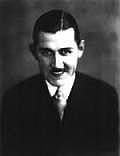Charley Chase
|
|
Charley Chase (Charles Joseph Parrott) (October 20, 1893-June 20, 1940) was an American comedian, screenwriter and film director, best known for his work in Hal Roach short film comedies. He was the older brother of comedian/director James Parrott.
Born Charles Parrott in Baltimore, Maryland, Chase started his career in films by working at the Al Christie comedy unit in 1912. He then moved to Keystone Studios where he began appearing in bit parts in the Mack Sennett films, including those of Charles Chaplin.
In 1920, he began working as a film director for Hal Roach Studios; among his notable early works for Roach was supervising the first entries in the Our Gang series. He eventually moving back in front of the camera with his own series of shorts, adopting the screen name Charley Chase. Chase's initial comedies were directed by Leo McCarey, who in collaboration with Chase formed the comic style of the series, with an emphasis on situation comedy, characterization, and farce instead of knockabout slapstick. From the start of his series until his death, Chase remained the guiding hand behind the films, acting as director, writer, and editor (though he only began to receive director's credit at Roach in 1933 as Charles Parrott.) Chase's starring shorts of the 1920s, particularly Mighty Like a Moose, Fluttering Hearts, and Limousine Love, are among the finest in the silent comedy genre.
Charley Chase moved with ease into sound films in 1929 and continued to be quite prolific, occasionally putting his fine singing voice on display and including his self-penned songs in his comedy shorts. Chase's The Pip From Pittsburg, produced in 1931, is one of the most celebrated Hal Roach comedies of the 1930s. Throughout the decade, the Charley Chase shorts continued to stand alongside Laurel and Hardy and Our Gang as the hallmark output of the Roach studio. Chase appeared on-screen with Laurel and Hardy a number of times, and co-starred in their 1933 feature film Sons of the Desert. Chase's failure to adapt to the feature film format was primarily responsible for his dismissal from the Hal Roach Studio in 1936.
In 1937, Chase began working at Columbia Pictures, where he spent the rest of his career continuing to star in his series of comedies as well as directing other Columbia personalities, such as The Three Stooges. Chase's tumultuous, fast-living lifestyle (he suffered from alcoholism for most of his professional career) began to take a serious toll on the comedian's health. Though still often producing quality comediesósuch as one of his last, The Heckler, which is considered to be one of his bestóChase's physical decline could not be ignored when viewing his work from the late 1930s. Charley Chase died of a heart attack in California on June 20, 1940.
Renewed Interest
Since the 1990s, there has been a small revival of interest in the films of Charley Chase, due in large part to the increased availability of his work and the undated, contemporary feel of his best comedies. An extensive website, The World of Charley Chase, was created in 1996, and a biography, Smile When the Raindrops Fall, was published in 1997. His films, particularly his canonical silent work, are being screened in reperatory theaters more often than ever. Chase's sound comedies for Hal Roach were briefly televised in the late 1990s on the short-lived American cable network The Odyssey Channel. A retrospective of his silent comedies organized by The Silent Clowns Film Series was held in 1999 in New York City. A marathon of his silent films took place in 2005 on the American cable television network Turner Classic Movies. A Charley Chase DVD collection was released in 2004, and in 2005, another more extensive DVD set is in the works.
Books
- Anthony, Brian and Edmonds, Andy (1997). Smile When the Raindrops Fall: The Story of Charley Chase. Scarecrow Press. [First biography on Charley Chase.]
External Links
- Solan, Yair. The World of Charley Chase (http://www.geocities.com/ysolan82/chase.html) (1996-present).

